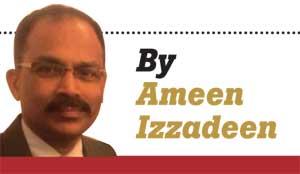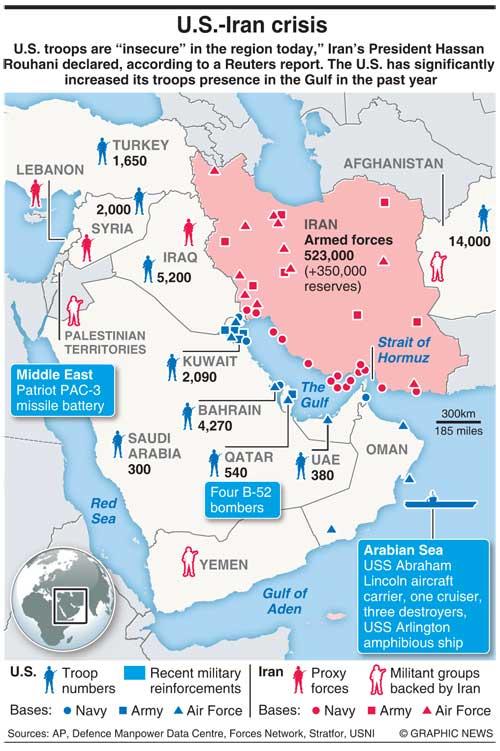Reply To:
Name - Reply Comment
Last Updated : 2024-04-19 21:20:00
Mercifully, the tensions between Iran and the United States did not escalate into an all-out war. If they had gone to war, the consequences would have been disastrous not only to the  region, but also to the whole world, including the US.
region, but also to the whole world, including the US.
With the Strait of Hormuz likely to be a major theatre of war in any war between Iran and the US, oil prices would have risen to more than US$ 200. This is because the strategic chokepoint accounts for a flow of more than 21 million barrels of fuel every day or about 21% of global petroleum consumption.
When the Trump administration in May 2018 withdrew from the Joint Comprehensive Plan of Action (JCPOA) or Iran’s nuclear agreement with world powers and followed it up with fresh US sanctions, the Islamic Republic warned that if it was not allowed to sell its oil, it would make sure that no country in the region sold oil – a clear warning that oil tankers in the Strait of Hormuz would be hit, if Iran found the going was tough. Such a scenario would have plunged the world in a major recession with chaotic repercussions.
Thanks to backchannel diplomatic efforts by France, Japan, Saudi Arabia, Qatar and several other countries, both Iran and the US withdrew from brinkmanship and averted a major war last week, although some 170 innocent people paid with their lives when Iran mistakenly shot down a Ukrainian passenger plane, assuming it was an enemy aircraft. Of course, the Iranians argue that these passengers would not have died, if Trump had not triggered the escalation by killing Iran’s top general Qassem Soleimani.
In spite of relief that saner counsel had prevailed to prevent what could have been West Asia’s biggest war since World War I, both Iran and the US have not abandoned hostilities. US President Trump slapped fresh sanctions on Iran after allowing Iran to hit two Iraqi air bases where US troops had been accommodated.
The US action indeed discounted Iran’s de-escalation message wrapped in the missile attacks. There was more cooperation than conflict in Iran’s retaliation, for it let the Americans know in advance that the attack was coming, giving the US troops ample time to stay away from harm’s way. Kudos must go to Iran for acting in a mature way and contributing towards the de-escalation of the crisis.
 But this does not mean that hostilities have ceased, far from it. Since 1979, both Iran and the US have been engaged in what is now being described as hybrid warfare.
But this does not mean that hostilities have ceased, far from it. Since 1979, both Iran and the US have been engaged in what is now being described as hybrid warfare.
The US National Military Strategy published in 2015 was the first to mention hybrid warfare, though various manifestations of it have been in practice since nation states came into being.
Hybrid warfare is described by US strategists as a blending of conventional, non-conventional, law enforcement, criminal gangs, information warfare, and even terrorist means and methods in deliberate actions carried out by military, paramilitary, mercenary and non-military forces to achieve traditional military objectives, including territorial control of conquest.
Nations that resort to hybrid warfare carry out operations in a manner designed to avoid triggering a larger military conflict. In this context, the Cold War that existed in the post-World War II period until 1991 was also a form of
hybrid warfare.
In the South China Sea and the Indo-Pacific region, China and the United States are engaged in hybrid warfare. In Europe, Russia and Nato powers-led by the US are into it. In conflict- ravaged West Asia, engaged in hybrid warfare to varying degrees are the United States, Israel, Iran, Saudi Arabia, Turkey and other countries.
Cyber-attacks have become an important part of hybrid warfare. An Iranian official recently commented that in 2018 his country dealt with 33 million cyber-attacks. The US believes that just as Russia and China are, Iran is also actively involved in hacking into US systems.
Economic warfare is also part of hybrid warfare. By imposing sanctions aimed at crippling Iran’s economy, the US is waging an all-out economic war against Iran. The US believes these sanctions could set off riots by angry Iranians and eventually lead to the overthrow of the Iranian regime. In Iran in recent years, several protests have erupted over various issues. Last week, protests erupted in universities in Teheran and other cities over the shooting down of the Ukrainian plane. The protests received moral support from Trump and British Prime Minister Boris Johnson. Iran also in recent months saw protests over high living costs and fuel price hikes. These protests are largely led by youth, who were born a decade or more after the 1979 revolution. They have not experienced the Shah’s tyranny which their parents had suffered. They have not known their parents’ sacrifice throughout the nine-year war started by Iraq under Saddam Hussein with the support of several Arab countries and the United States.
The killing of Soleimani in a targeted assassination ordered by US President Trump is certainly an attempt at testing the ultimate point where hybrid warfare ends and all-out war begins. The Soleimani killing is not the only assassination Iran has suffered. Between 2010 and 2012, four Iranian nuclear scientists were killed in separate incidents blamed on Israel.
If Iran had not responded to the Soleimani killing, Trump would have dragged his country to war against the will of a majority of American people.
Usually, in hybrid warfare, nations take extreme caution not to trigger a hot war. But when mavericks like Trump, who many believe lacks basic foreign policy understanding, take control of state affairs, it is only a matter of time before hybrid warfare turns into a dangerous war.
In most cases, nations are confused whether a particular action of another nation is an act of war or peace. This is because hybrid warfare takes place largely in a grey zone.
According to Nato, hybrid methods are used to blur the lines between war and peace, and attempt to sow doubt in the minds of target populations. Therefore Nato underscores the need to be prepared. Iran’s decision to disregard the uranium enrichment limits set by the nuclear deal it has signed with world powers and the European powers’ decision to invoke the agreement’s dispute clause in response can be described as offensive and counter-offensive in hybrid warfare.
With lack of clarity in hybrid warfare, peacemaking has become an increasingly difficult task. Wars can be won, lost or brought to a settlement. But in hybrid warfare, there are no winners, no ceasefires.

Add comment
Comments will be edited (grammar, spelling and slang) and authorized at the discretion of Daily Mirror online. The website also has the right not to publish selected comments.
Reply To:
Name - Reply Comment
On March 26, a couple arriving from Thailand was arrested with 88 live animal
According to villagers from Naula-Moragolla out of 105 families 80 can afford
Is the situation in Sri Lanka so grim that locals harbour hope that they coul
A recent post on social media revealed that three purple-faced langurs near t